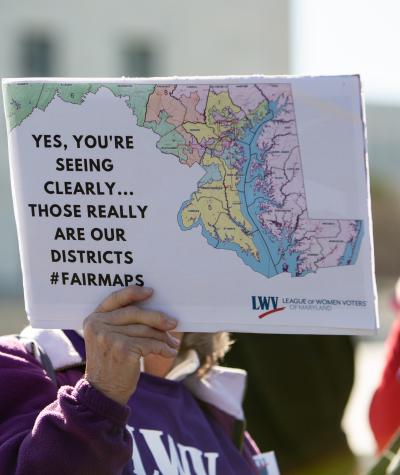Campaign Legal Center (CLC) submitted an amicus brief in the Maryland legislative redistricting case encouraging the court to adopt the widely used and reliable standards and tools to evaluate partisan gerrymandering and rule that Maryland’s Declaration of Rights limits lawmakers’ ability to use partisan gerrymandering to silence voters holding minority political viewpoints.
CLC’s brief argues that partisan gerrymandering harms people’s freedom to vote and right to participate equally in the political process. Maryland’s maps should provide for the fair and effective representation of all citizens, not just those likely to support the political party drawing the map.
Politicians gerrymander to serve their own partisan interests instead of the interests of the communities they serve. By skewing district lines, mapdrawers can pick their voters instead of voters picking their representatives.
Gerrymandering limits competitiveness in elections, increases partisan polarity and impairs democratic accountability, ultimately leading to political dysfunction.
The harms of partisan gerrymandering have gotten worse in the last few redistricting cycles, as technology has enabled self-interested politicians to create more precise gerrymanders that lock in their control of state legislatures and the redistricting process for at least the next 10 years.
Despite the harm partisan gerrymandering does to our democracy, the U.S. Supreme Court ruled in the 2019 case Rucho v. Common Cause that federal courts were powerless to decide partisan gerrymandering disputes because, in the Court’s view, the U.S. Constitution’s text did not provide a “manageable standard” for addressing gerrymandering.
But in Rucho, the Court said that state courts applying state constitutions have greater ability to restrain extreme partisan gerrymandering.
Following Rucho, the role of state courts in applying constitutional protections is vital to ensure that voters are able to exercise their freedom to vote and make their voices heard through fair maps. Courts in states around the country — from Pennsylvania to North Carolina to Colorado — have stepped up to make sure that their citizens have the freedom to vote under fair maps.
In Maryland, a trial court has already intervened to prevent voters from living under an extremely gerrymandered congressional map. The judge threw out the proposed map this March, finding for the first time in the state’s history that the gerrymandered district lines violated the Maryland Constitution, including the people’s rights to equal protection, free speech and free elections.
The judge gave the legislature a week to draw a new fair congressional district map, which was quickly signed into law by Gov. Larry Hogan.
In a separate case concerning the state legislative redistricting process, Maryland’s high court rejected the challenge to the maps by finding that there was not enough compelling evidence of an extreme partisan gerrymander.
When the Maryland Court of Appeals issues its opinion in the state legislative case, it is imperative that the court set the precedent that Maryland’s Declaration of Rights protects Marylanders against partisan gerrymandering.
Fair and community-driven districting is key to empowering voters and ensuring that elections reflect the will of the people, no matter where they live, their background or who they support. Maryland courts must put an end to partisan gerrymandering so that voters, not politicians, are the ones who decide the outcome of elections.
